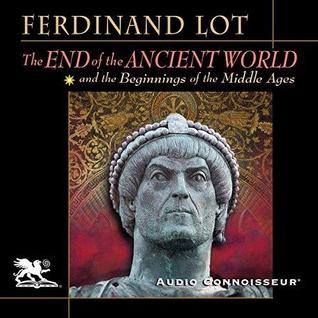4 out of 5 stars ****
Copious and comprehensive describes Ferdinand Lot's The End of the Ancient World and the Beginning of the Middle Ages. The scope of information over hundreds of years reaches back into ancient history to compare the advancements, artistry, and lack thereof through the ages among many civilizations in the known world; basically Asia, Europe, and North Africa. Charlton Griffin, the narrator, uses just the right amount of snobbery in his articulation of events and the arts that demarcate the Ancient from the Middle Ages.
A great historian fascinated with the decline of the Roman Empire and the rise of Medieval times, Lot, for the first time, reveals the reasons Rome fell other than political and military. With perfect diction and pronunciation, Griffin explains that the mere size of the Roman Empire, with its asymmetrical demands, lead to the wealth transferring from the West, the needy, to the East, the providers. To meet the needs of the poor, increased taxation of that population only leads to despair and hopelessness. Suffice it to say, such a civilization is depressed and vulnerable to barbarian invasion.
Lot describes the barbarians and the existing empire through their architecture, literature, paintings, sculpture, geography, politics, social structure, linguistics, belief systems, as well as military prowess. A marked erosion of the pure art form becomes evident when a practical approach to life becomes more universal as wave after wave of marauders disturb the establishments of an anemic society. In some cases, the conquerors allow the existing social structures to remain for better compliance by subjects to their reign. In many other cases, the invaders impose their own customs upon the people and this change is responsible for furthering the distance between progress and stagnation.
This reader finds the subject of this book most interesting because the details of past civilizations are repeating in today's world. The trend of blossoming in a free society is evident more than it is in a suppressed one. Even in a strong, stable society, there are pitfalls that slowly wear away the best accomplishments. The characteristics about which Lot writes are prone to the flaws of man. The arts suffer, the military weakens, the economy is filtered through the greedy, and individuals are taxed into despair. The government must assert more power over the governed in order to make ends meet in the meantime. The powers that be in the realms of religion act in the same manner as the secular powers for preservation's sake.
A book that eloquently shows the reader outcomes from past mistakes is necessary if a society desires to prevent complacency and rigidity in the extremes that lead to darker ages in the future.

No comments:
Post a Comment